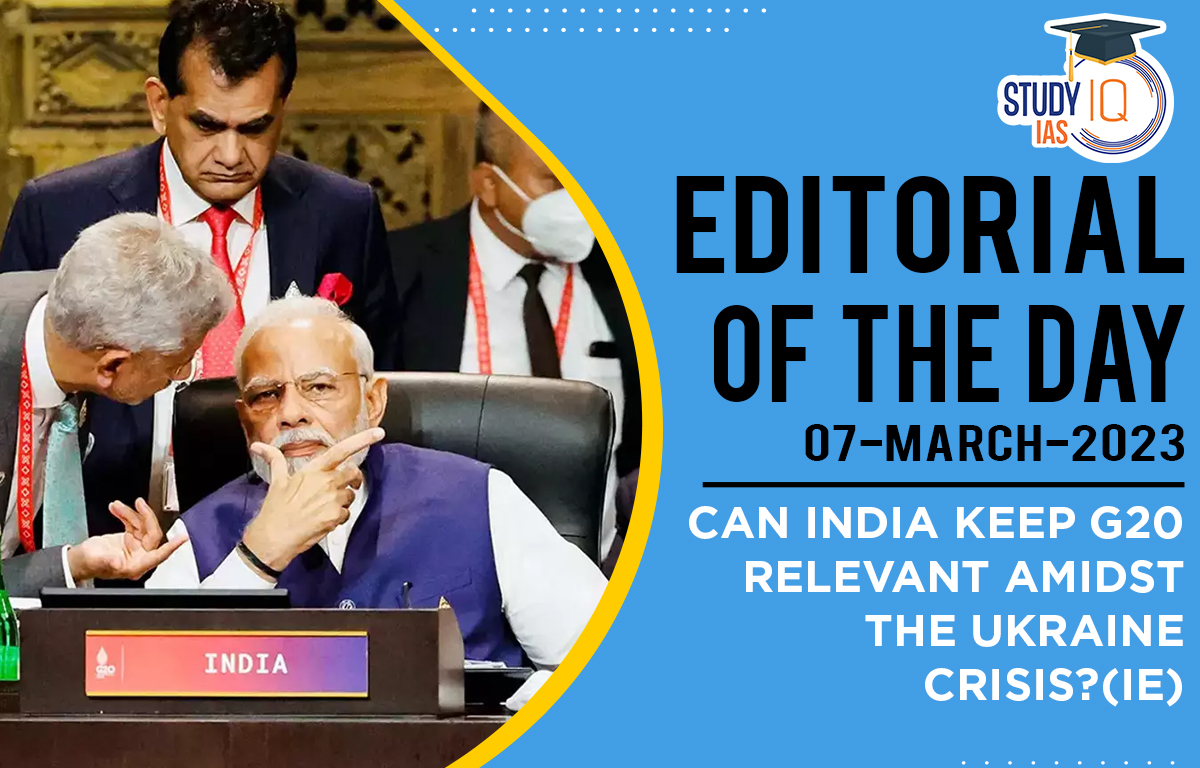Table of Contents
The G20 Summit in Bali failed last year due to resolute insistence of the United States and its allies to reprimand Russia for its invasion of Ukraine.
- By pushing a political issue onto an economic and financial forum (G20), the G7 are on the verge of destabilising the New Delhi G20 Summit.
- The G20 forum was not previously used to discuss global security and geo-political issues when the US and its NATO allies waged war across Asia and Africa over the past quarter century.
- European political leadership may be under pressure to use every global platform to denounce Russia, but such anti-war sentiment in the Global South did not stop the West from securing its geopolitical interests.
The Evolution of G20
- Formation: The G20 was formed in 1999 as a gathering of finance ministers of globally consequential economies following the Asian financial crisis of 1997-98.
- Expansion: After the trans-Atlantic financial crisis hit the US and Europe, it was decided to expand the grouping and include more countries to stabilize the global financial system and sustain global economic growth.
- Opportunity: This expansion turned out to be critical moment for developing countries such as India, Indonesia, Brazil, South Africa and countries as they would all be involved in vital national and international interest relating to economic development and international finance.
- Success: The first three G20 summit attained significant success due to a series of policy and institutional initiatives that stabilized the global economy, the global banking and financial system and the euro.
Recent Trends in G20
- Interest groups: Currently, the G20 are divided into three groups — the G7, the Global South (such as Indonesia, India, Brazil and South Africa), and China – Russia.
- Global South Agenda: India has tried to walk the tightrope between East and the West, declaring its intention to be the “voice of the Global South”.
- The Indian Prime Minister has already set an ambitious agenda to advance the developmental interests of the global South.
- Ignorance of G7: The G7 have shown little interest in advancing developmental agenda of Global South, other than providing lip service. The activism by G7 shows a circling of wagons syndrome within the developed economies.
- Deterioration of ties: US-China and US-Russia relations have deteriorated in recent times, but the new arrivals from the Global South have begun to assert themselves, aiming to shape the G20 agenda.
- Supporting G7 agenda: The G7 also seems wary of the Global South agenda and is unlikely that the Global South would secure any significant gains from the New Delhi summit, unless India toes G7 line on Russia.

Conclusion
- G7 may still be willing to address issues of interest to developing countries, like external debt, climate finance and access to technology and markets, if they are willing to denounce Russia and China.
- India can either choose to accept a summit without results, or fall in line with the G7 agenda. Either way, the G20 faces risk of declining relevance to global economic governance.


 MP Police Constable Admit Card 2025 Out ...
MP Police Constable Admit Card 2025 Out ...
 UPPSC PCS Cut Off 2025: Check Expected a...
UPPSC PCS Cut Off 2025: Check Expected a...
 Diwali 2025 Calendar: Dhanteras to Bhai ...
Diwali 2025 Calendar: Dhanteras to Bhai ...




















